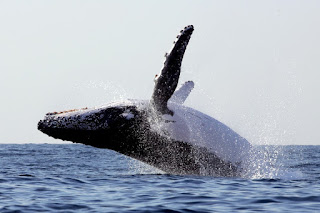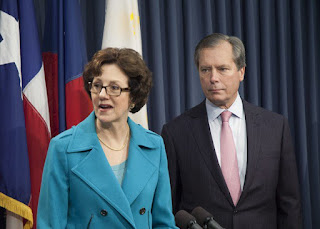1. Sea Save Foundation and Others at United Nations: Ocean Conference. How Should We Govern the Open Ocean?
 The open ocean is at risk from climate change, over-fishing, deep-sea mining, farm pollution, and plastics. This situation is even more dire since 60% of the ocean has no conservation rule as it's outside national jurisdiction. Representatives at a UN Ocean Conference are focusing discussions towards international agreement on how to protect and manage ocean biodiversity. Together they hope to set up legal framework for marine conservation, look more rigorously into environmental impact before industrial activities are undertaken, and develop rules around marine resources so all nations can share the wealth of the seas.
The open ocean is at risk from climate change, over-fishing, deep-sea mining, farm pollution, and plastics. This situation is even more dire since 60% of the ocean has no conservation rule as it's outside national jurisdiction. Representatives at a UN Ocean Conference are focusing discussions towards international agreement on how to protect and manage ocean biodiversity. Together they hope to set up legal framework for marine conservation, look more rigorously into environmental impact before industrial activities are undertaken, and develop rules around marine resources so all nations can share the wealth of the seas.
-----------------------------------------------
A one trillion ton iceberg, the biggest on record, has broken off of Antarctica sometime between July 10 and 12. It is the size of Delaware. The interesting thing is what happens next: Will the ice shelf weaken and collapse? Will the glaciers behind this iceberg accelerate and have a direct contribution to sea-level rising? Or is this just a normal calving event? Opinions in the scientific community are divided and it is too early to blame this event on human generated climate change. Currently, it only poses an added risk to ships.
Read More...
-----------------------------------------------
3. U.S. Executive Order Opens Door to Atlantic Ocean Oil Drilling

The executive order to open up the Atlantic Ocean to oil drilling is being followed by The National Marine Fisheries Service permitting five companies to begin seismic airgun blasting, the controversial technique for detecting reserves of oil and gas. Many scientists say that it poses an unacceptable risk of serious harm to marine life from plankton all the way up to fish and whales. Bipartisan bills have been introduced with unpolarized support in both the House and Senate that would ban seismic testing.
-----------------------------------------------
4. Susan Combs Once Stated that Endangered Species Act - "Threatens to Blow Up Texas Economy" Now in Charge of the Proverbial Henhouse
 Former Texan comptroller Susan Combs was appointed by the Trump administration to be assistant secretary for policy, management and budget in the Department of the Interior. This department overlooks the U.S. Fish and Wildlife Service and is therefore responsible for the Endangered Species Act, of which she has been a strong critic. She has publicly vowed to protect Texas business interests and has “likened the endangered species listings to ‘incoming Scud missiles' that threaten to blow up the Texas...economy’.
Read More...
Former Texan comptroller Susan Combs was appointed by the Trump administration to be assistant secretary for policy, management and budget in the Department of the Interior. This department overlooks the U.S. Fish and Wildlife Service and is therefore responsible for the Endangered Species Act, of which she has been a strong critic. She has publicly vowed to protect Texas business interests and has “likened the endangered species listings to ‘incoming Scud missiles' that threaten to blow up the Texas...economy’.
Read More...
 Former Texan comptroller Susan Combs was appointed by the Trump administration to be assistant secretary for policy, management and budget in the Department of the Interior. This department overlooks the U.S. Fish and Wildlife Service and is therefore responsible for the Endangered Species Act, of which she has been a strong critic. She has publicly vowed to protect Texas business interests and has “likened the endangered species listings to ‘incoming Scud missiles' that threaten to blow up the Texas...economy’.
Former Texan comptroller Susan Combs was appointed by the Trump administration to be assistant secretary for policy, management and budget in the Department of the Interior. This department overlooks the U.S. Fish and Wildlife Service and is therefore responsible for the Endangered Species Act, of which she has been a strong critic. She has publicly vowed to protect Texas business interests and has “likened the endangered species listings to ‘incoming Scud missiles' that threaten to blow up the Texas...economy’.
-----------------------------------------------
5. Stanford Study: We are Currently in Greatest Period of Extinction Since Dinosaur Eradication
 According to a 2015 study, earth has entered a period of mass extinction unparalleled since the dinosaurs, with 2 vertebrate species going extinct every year on average. A recent study done at Stanford found that more extreme to this 'seemingly' slow rate of extinction, 30 percent of vertebrates have declining populations and ranges, which tells the more dire story of "biological annihilation occurring globally". This loss of populations and biodiversity rob us of "crucial ecosystem services such as crop pollination, pest control, and wetlands' water purification". In addition, this reduction within intricate ecological networks leads to less resilient ecosystems. The authors of this study call for immediate action to curb the basic drivers of extinction: human overpopulation and overconsumption.
According to a 2015 study, earth has entered a period of mass extinction unparalleled since the dinosaurs, with 2 vertebrate species going extinct every year on average. A recent study done at Stanford found that more extreme to this 'seemingly' slow rate of extinction, 30 percent of vertebrates have declining populations and ranges, which tells the more dire story of "biological annihilation occurring globally". This loss of populations and biodiversity rob us of "crucial ecosystem services such as crop pollination, pest control, and wetlands' water purification". In addition, this reduction within intricate ecological networks leads to less resilient ecosystems. The authors of this study call for immediate action to curb the basic drivers of extinction: human overpopulation and overconsumption.-----------------------------------------------
-----------------------------------------------

Corals living near the sunlit surface need protection from the UV light. UV light damages their surface algae thereby interfering with the symbiotic relationship that must be maintained for their sustenance. These shallow water corals fluoresce to protect their little algae buddies from the damaging UV rays. Scientists always wondered why deep sea corals, hidden from sunlight, also fluoresce. A recent study showed that these deep sea corals have taken this trick of fluorescing and turned it to their advantage of producing their own sunlight in the deep sea darkness. This sunlight production aids their surface algae in the photosynthetic process thereby continuing to foster the symbiotic relationship between coral and algae that is observed in shallow waters.
-----------------------------------------------
8. Rising Sea Temperatures Will Have Greatest Impact on Small, Poor Developing Nations With Smallest Carbon Footprint
 In contrast to their small carbon footprint, small island developing states and the world's least developed countries are facing the largest consequence of climate change's impacts on marine life. This disparity confirms the importance of the UN's Sustainable Development Goal #14 which includes a "target of increasing the economic benefits to least-developed countries from the sustainable use of marine resources". The outcome of the UN Oceans Conference similarly emphasized the importance of supporting these vulnerable places.
In contrast to their small carbon footprint, small island developing states and the world's least developed countries are facing the largest consequence of climate change's impacts on marine life. This disparity confirms the importance of the UN's Sustainable Development Goal #14 which includes a "target of increasing the economic benefits to least-developed countries from the sustainable use of marine resources". The outcome of the UN Oceans Conference similarly emphasized the importance of supporting these vulnerable places.
-----------------------------------------------
9. G20 Attendees Rebuke Recent Decision for US to Leave Paris Accord
 At the G20 summit, participants agreed that the Paris climate accord was irreversible and they remained committed to it. Even Mr. Putin called climate change a "major issue" and commended Germany's Angela Merkel on having reached a "good compromise". The G20 summit, hosted in Germany, which was expected to focus on many global issues, conclued with Merkel announcing her sadness of the US's intention of leaving the climate agreement.
At the G20 summit, participants agreed that the Paris climate accord was irreversible and they remained committed to it. Even Mr. Putin called climate change a "major issue" and commended Germany's Angela Merkel on having reached a "good compromise". The G20 summit, hosted in Germany, which was expected to focus on many global issues, conclued with Merkel announcing her sadness of the US's intention of leaving the climate agreement.
-----------------------------------------------
Be sure to "LIKE" http://facebook.com/SeaSave to ensure our "Week in Review" is delivered to your newsfeed every Friday.
Sea Save Foundation is committed to raising awareness of marine conservation. The Week in Review is a team effort produced by the Sea Save staff to provide a weekly summary of the latest in marine research, policy, and news.

